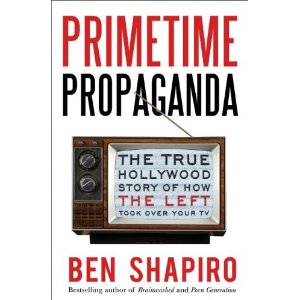In this thoroughly researched and detailed history of the television industry, conservative columnist and author Ben Shapiro argues that left-leaning entertainment kingpins in Los Angeles and New York have leveraged—and continue to use—their positions and power to push liberal messages and promote the Democratic Party while actively discriminating against their opponents on the Right. According to Shapiro, television isn’t just about entertainment—it’s an attempt to convince Americans that the social, economic, and foreign policy shaped by leftism is morally righteous.
But don’t take his word for it. Shapiro interviewed more than one hundred of the industry’s biggest players, including Larry Gelbart (M*A*S*H), Fred Silverman (former president of ABC Entertainment, NBC, and vice president of programming at CBS), Marta Kauffman (Friends), David Shore (House), and Mark Burnett (Survivor). Many of these insiders boast that not only is Hollywood biased against conservatives, but that many of the shows being broadcast have secret political messages. With this groundbreaking exposé, readers will never watch television the same way again.
(Benjamin Shapiro)

A Review of the book:
Primetime Propaganda is not a content analysis of the last 60 years of TV. Instead, Shapiro wore his Harvard Law baseball cap and interviewed some of Hollywood’s most influential television creators. Assuming from his alma mater and last name that he was one of them, the Hollywood insiders were too honest for their own good. Time and again Shapiro found them confessing that A) Yes, the Left dominates Hollywood, B) Yes, conservatives are blacklisted, C) Yes, they did try and use television to push their politics, and D) No, they did not see anything wrong with any of this in the slightest.
(For the evidence on tape see Big Hollywood’s thorough archive of the many damning admissions from the creators of history’s most influential TV shows.)
The revelations Shapiro unearths are only the beginning. This is also a masterful history book that will transform readers’ understanding of television. Shapiro leaps back to the 1950s and in the first 220 pages of the book interweaves his blockbuster interviews with the story of how a small clique of executives, producers, and writers created most of the TV shows that have shaped four generations of Americans. The heart of the book is the second and third chapter, focusing on the history of TV comedies and dramas. Shapiro goes down the line from The Honeymooners to All in the Family to Cheers and Friends. He documents the subversion of the cop and legal dramas from the early days of righteous cops and prosecutors to the nihilism of Hill Street Blues and Picket Fences.
The picture that emerges from Shapiro is of Hollywood leftists distinct from Washington, DC Democratic Party leftists, ACORN community organizing leftists, and the academic Ivory Tower leftists. The defining characteristic of the Hollywood leftist is an embarrassing abundance of anti-intellectualism. Most of the producers and writers Shapiro profiles have barely thought through their politics. If that’s the case then what drives Hollywood to embed leftist ideas in their programs and exclude conservatives? Superficial notions about what feels right. The Hollywood Left fantasizes that they are the champions of the “have-nots,” the outsiders, the oppressed.
This anti-intellectualism is why in Hollywood the ABSOLUTE MOST IMPORTANT politics are the social issues. (As evidence that Hollywood leftists care about these subjects above all others, observe how they will tolerate hawkish, fiscally conservative Republicans as long as they’re pro-gay and pro-choice. Shapiro’s example: “Desperate Housewives” creator Marc Cherry.)
Hollywood is not a town of deep thinkers. It’s a bubble filled with deep feelers. Next time a Hollywood leftist is on TV spouting their clichés note how often they “feel” instead of “think.” That’s a Freudian slip confessing a disagreement not with what conservatives think but in how conservatives think. The rejection is not just the Western tradition of individual liberty, but in the Enlightenment process of rational thought.
What are the unique implications for apostates of this church of the Left?
In parts two, three, and four of this series I’ll explore Roger L. Simon’s Turning Right at Hollywood and Vine, David Mamet’s The Secret Knowledge, and Andrew Breitbart’s Righteous Indignation. Each author’s book is an important component in the revolt against the Hollywood Left’s mental gulag. They each bring the best of what their generation has to offer in the fight to retake our culture and our country. Read all three along with Shapiro’s book and a comprehensive picture of the Hollywood Left – and the means for defeating it – emerges.
Adapted from BigHollywood